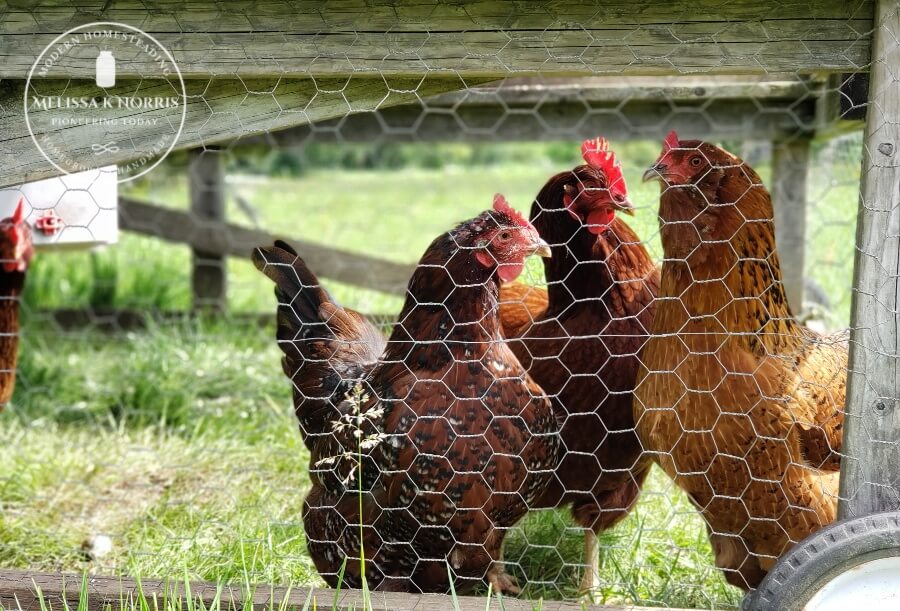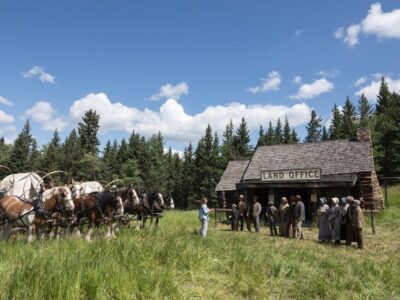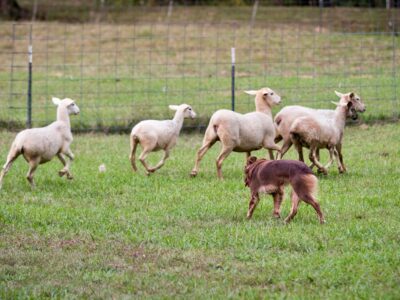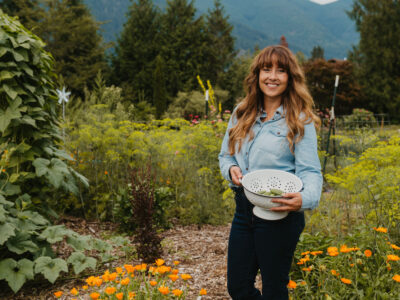Join me in this podcast and blog post with special guest Joel Salatin as we discuss mRNA in livestock and how that translates into our food supply.
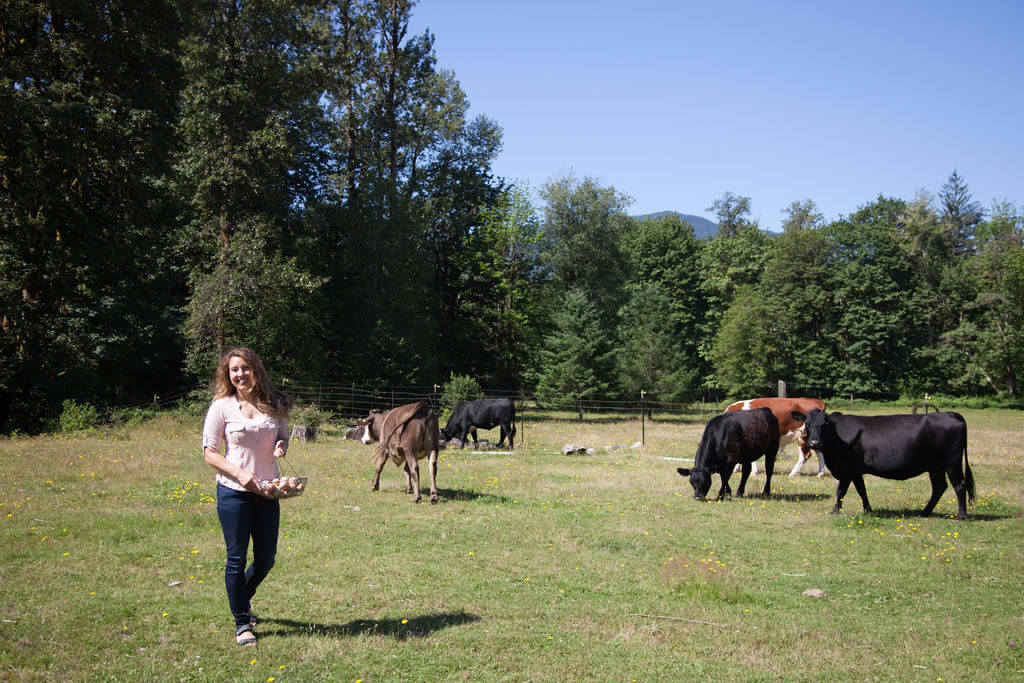
I've had Joel on the podcast before where we discussed how to maximize your homestead for profit and production. Anytime I get to sit down and chat with Joel I learn something new and have a great take-away to implement on my own homestead. Today's episode is no different!
About Joel Salatin
This is Pioneering Today Podcast episode #391 with Joel Salatin. Joel is the grandfather of the modern homesteading movement, especially in regard to regenerative agriculture and spreading the word even beyond the homesteading community for this way of living.
This also includes the health of our livestock and how their living conditions are crucial to overall health and homestead management.
What is mRNA?
Most of us have never heard of mRNA prior to 2020. So what is it?
The truth is research is still being done on mRNA and what it is, how it's used and what it does is ever evolving. A quick definition from genome.gov, “Messenger RNA (abbreviated mRNA) is a type of single-stranded RNA involved in protein synthesis. mRNA is made from a DNA template during the process of transcription. The role of mRNA is to carry protein information from the DNA in a cell’s nucleus to the cell’s cytoplasm (watery interior), where the protein-making machinery reads the mRNA sequence and translates each three-base codon into its corresponding amino acid in a growing protein chain.”
As it turns out, the livestock industry has been using this “gene therapy” vaccine for a long time.
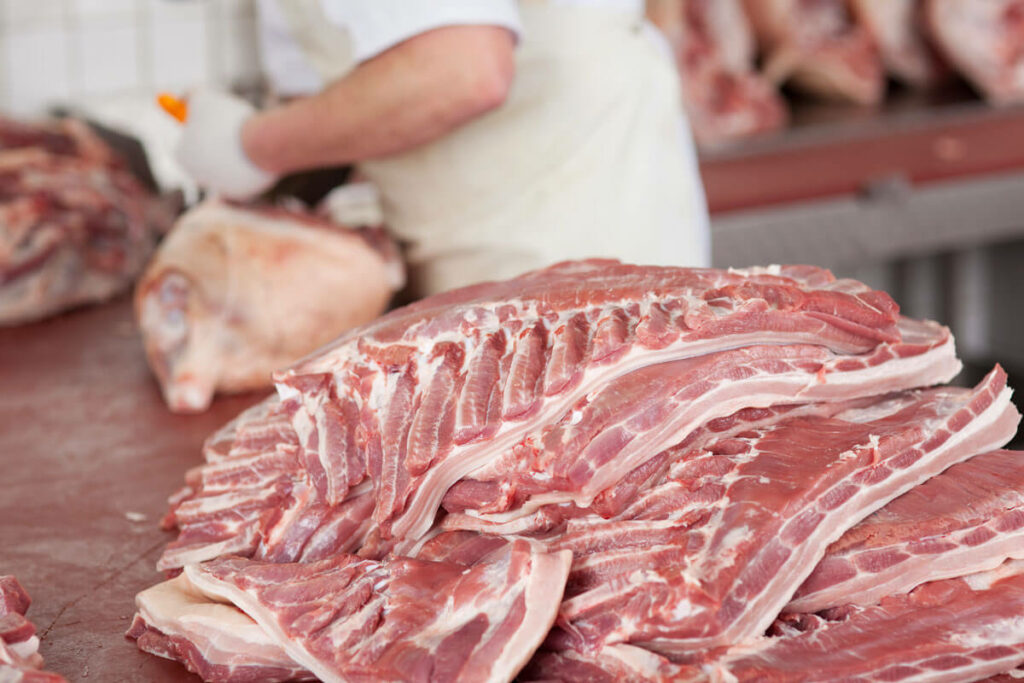
mRNA in Food
One of the major concerns about mRNA in livestock is that it transfers genetically and meat labeling laws don't require it to be labeled.
That means you can go to a restaurant where they're serving meat that's been given mRNA and they don't have to disclose this information. So for those of us who have avoided getting the COVID vaccine, we now could be getting mRNA through our food choices.
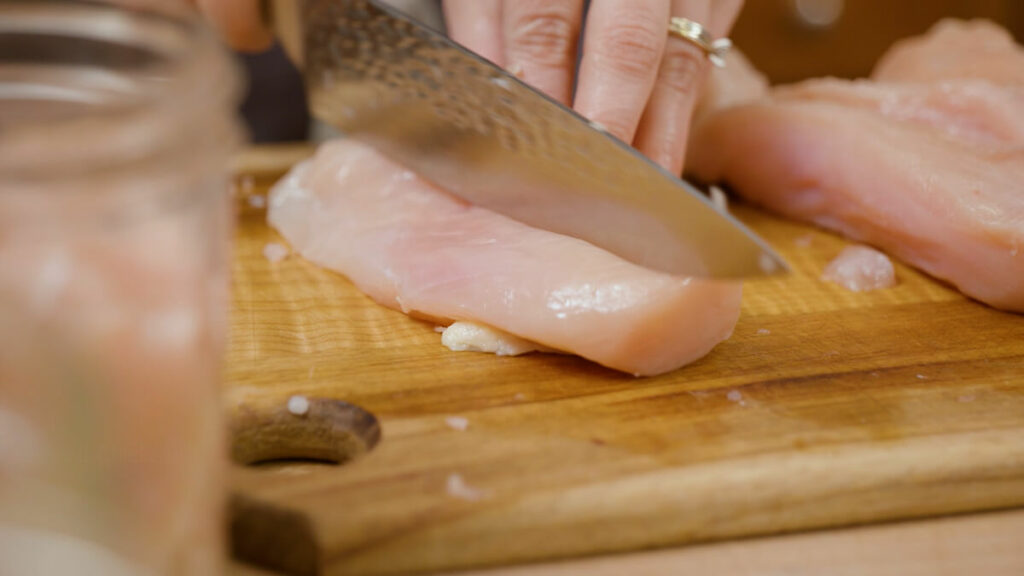
“Antibiotic-Free” Meat
There's now a big push from consumers to purchase meat that's antibiotic-free. Large companies and farms know this, so they've been actively searching for alternatives.
Because of the living conditions of large CAFOs (Concentrated Animal Feeding Operations), raising healthy animals is an impossibility. Therefore, these animals are routinely given antibiotics to keep them “healthy.”
CAFOs have been looking for ways around this for a long time, but what they're not willing to do is adopt the healthy way of raising animals which is on a smaller scale, or where each animal has adequate, clean living space.
With the introduction of mRNA (for poultry, it was introduced in 2015, for pork in 2018 and for cattle in 2021), these companies can now give their livestock the mRNA vaccine and label their food “antibiotic-free,” but now they're using the mRNA vaccine. So though they can “truthfully” say their animals have not been given antibiotics, they have been given something.
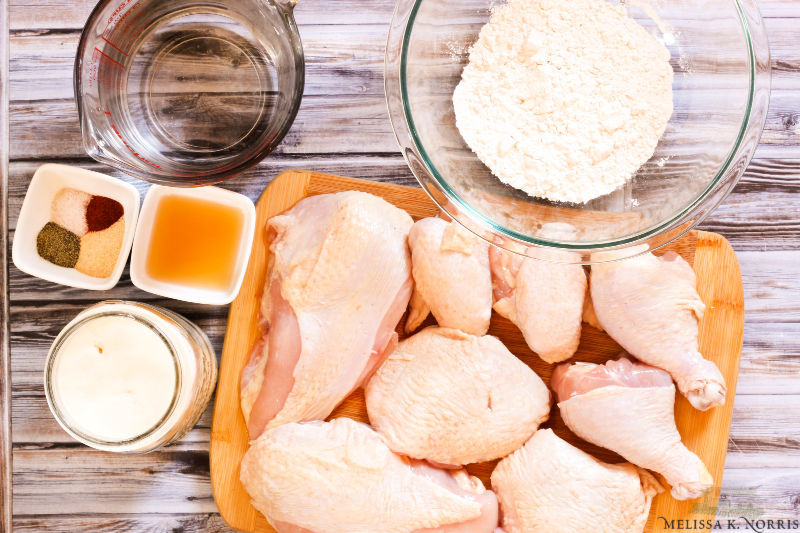
Can I Just Buy Organic?
Unfortunately, the organic certification does not protect you or give you the confidence to know that your meat hasn't been given mRNA or any other vaccines.
The organic companies have taken a backseat to the vaccine conversation, and the certification process does not include whether or not an animal has been vaccinated.
The USDA says, “Since organic farmers can't routinely use drugs to prevent diseases and parasites, they mostly use animal selection and management practices. Only a few drugs, such as vaccines, are allowed. If approved interventions fail, the animal must still be given all appropriate treatment(s).” (Source)
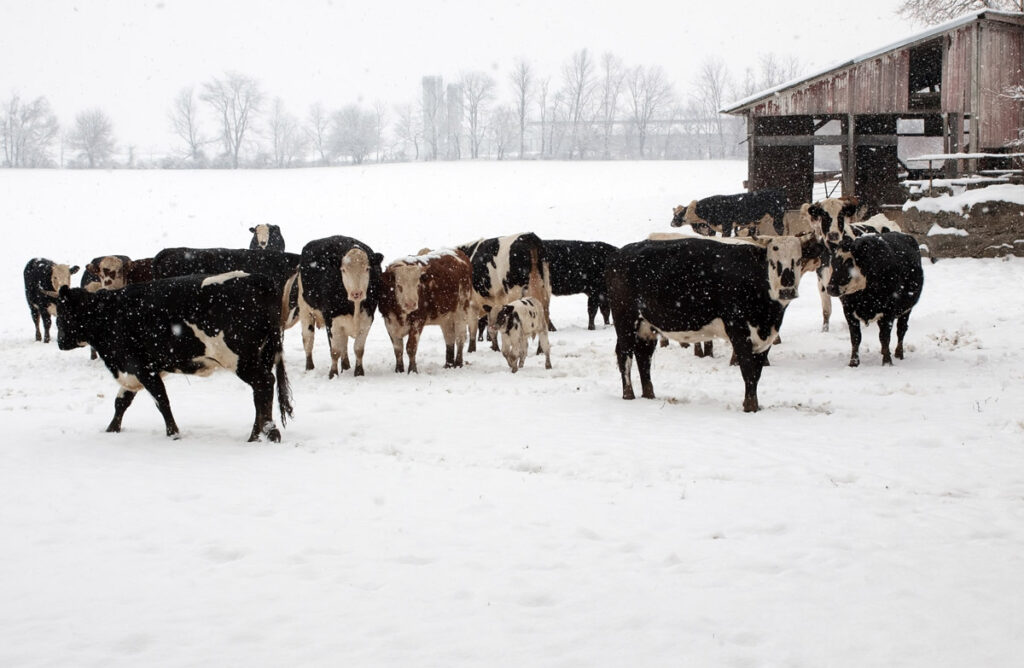
Do Vaccines Make Healthier Livestock?
There seems to be some pretty big pushback from people in favor of vaccines. If something makes your animals “healthier,” why wouldn't you give it to them?
Sadly, with mass production of meat and CAFOs, the living conditions for livestock are horrible and diseases that weren't an issue a hundred years ago are now a big issue.
I grew up with a father who raised cattle, and at the height of his operation, he had 130 head of cattle, and not one ever received a vaccine. They were a healthy herd being raised on grass, free-range.
Joel mentions his similar operation. He raises 1,000 head of cattle and can recall two times when he's ever needed to use a vaccine. Because of his experience, he now knows anytime you need to use a vaccine it always comes down to mismanagement.
The two times Joel needed to vaccinate were due to mismanagement of his cattle herd where they were getting poked by blackberry bushes which allowed the introduction of the soilborne disease Blackleg.
The second instance was when he had to move a large flock of chickens out to pasture at a young age and they experienced a week of 40-degree rainy weather resulting in Merek's disease.
Knowing how to properly manage your livestock is critical if you want to avoid using unnecessary vaccinations.
Am I Anti-Vaccine?
In short, no. Both Joel and I aren't anti-vaccine. Vaccines do hold a purpose, and if it's a matter of losing 1,000 head of cattle to blackleg or giving them a round of vaccines to help eliminate the disease, we'll choose the vaccination.
Using vaccines as preventative measures isn't either of our approaches. We raise our livestock in a way that manages their health, provides healthy living conditions, and gives the animals the opportunity to live a healthy life, free of needing vaccines.
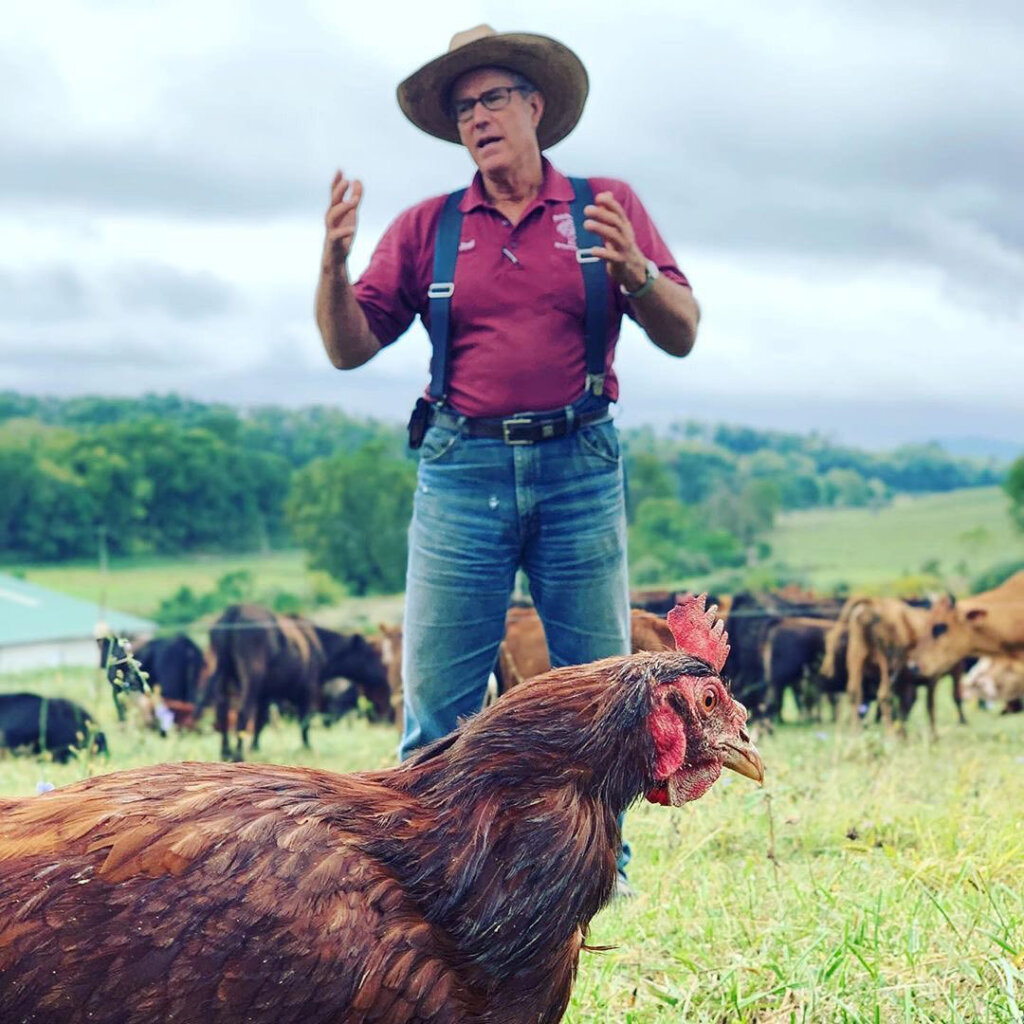
Know Your Farmer, Know Your Food
The only way to honestly know what you're getting from your meat is to know your farmer, and know your food. Purchase from a small farmer that you can talk to, ask questions, and maybe even visit the farm.
Smaller-scale farms that are raising their animals “the old-fashioned way” in a habitat that's actually healthy for the animals. Because of this, the farmers don't need to introduce vaccines because they're raising healthy livestock.
Want Beef From Us?
Want grass-fed, grass-finished beef raised right here on our homestead? We will have two 1/4 or one 1/2 beef available this September 2023.
Pick-up will be in Stanwood, Washington the end of September. To get on our waitlist to be notified when it's for sale, sign up here!
And if you're curious about the cuts of beef to get from the cow, or what you should know before butcher day, or the nutritional benefits of beef liver, check out those posts.
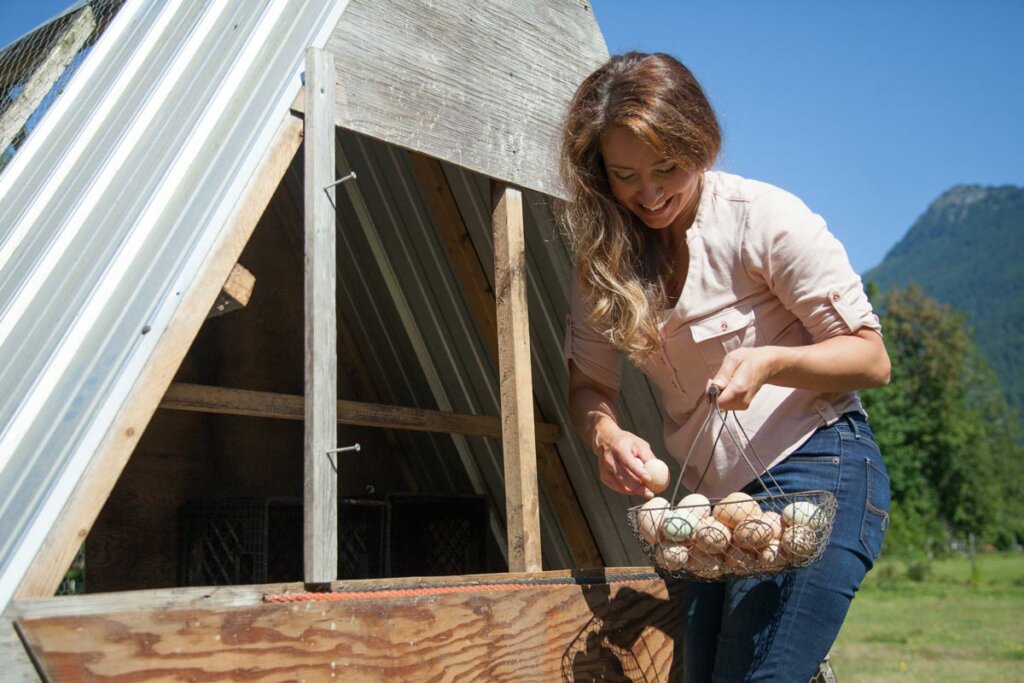
Be Encouraged & Take Action
Though there are some limitations depending on where you live, there are so many loopholes to raising your own livestock! Almost anyone in America can raise two cattle, five hogs, and 100 chickens, plus about 10-20 dozen eggs each week.
Joel says unless you're a hermit, you're circulating somewhere and can spread by word of mouth enough to sell this amount of livestock to earn a living for your homestead.
Here are two pieces of advice Joel wants to leave us with:
- Start viewing your outings as an opportunity to share what you're doing! Everyone has to eat, and you may be surprised that there are more people out there willing to buy locally than going to the local Walmart that just aren't speaking up. View yourself as allowing these people to break down the barriers of not relying on the grocery store.
- Don't start all at once. When we think about the whole picture, it's easy to get overwhelmed. For example, if you raised four hogs, one for yourself and three to sell, don't put pressure on yourself to sell all three hogs. Break them into half a hog and see if you can find one person willing to buy that. From there, work on the second half. These smaller tasks will make it more feasible. The same goes for a cow. Instead of selling a whole cow, think of it in quarters.
Where to Find Joel
If you'd like to learn more from Joel, he'll be speaking at the first annual Modern Homesteading Conference in North Idaho this June 30-July 1, 2023. You can grab tickets to the conference here.
You can also check out Joel on his website, Polyface Farm or @polyfacefarm on Instagram and Facebook.
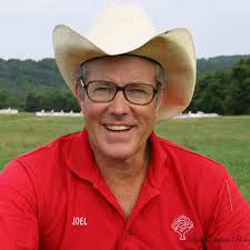
More Posts You May Enjoy
- Tips for Eating Nose to Tail
- What is A2 Milk & What are the Benefits?
- How to Make Beef Liver Supplements
- What to do When Homesteading Gets Tough
- How to Buy a Homestead – What to Look For
- How to Get Everything Done in a Day Without Wasting Time or Getting Distracted
Melissa: Hey, Pioneers. Welcome to episode number 391. Today's episode is a special one, and I have a very special guest, actually back for the second time. So I'm really excited about this guest and you'll see why in just a minute when we end up bringing him on. But on today's episode, we're going to be talking about mRNA vaccines, and not COVID related vaccines mRNA vaccine in humans, but mRNA vaccinations in meat, specifically in livestock that is intended for meat and for human consumption. And there's been a lot recently. You've probably seen floating around social media, a lot of talk about this in the last month. There's some legislation that's actually coming up in some of the states regarding this. And as with anything, you'll see a lot of both sides being presented, right? And it takes some diving into and getting to the heart and truth of the matter as best as we can because you'll see in this interview where there's a lot of things that are being said that are more half truths. And so interpreting those and deciding what is right for you and your family.
So that was the first part of the discussion, but regardless of what your stance or thoughts might be on mRNA technology in vaccines, it actually is a very good time for homesteaders and having choices for people when it comes to their meat via raising it themself or seeking out small farms and homesteads to be able to purchase meat from them directly instead of from a large place where you don't actually know how that animal's being treated, the meat that you're buying, what maybe it has been used or hasn't been used it as far as its healthcare goes. And so we've got some excellent tips. In fact, you will see me rapidly taking notes, and I had a huge aha moment in the way that we will be offering our grass-fed, grass finished beef locally to our customers. So I'll just tell you who's today guest is, it is Joel Salatin, and I always learn something from Joel. Every single time I have had the pleasure of speaking to him, either here on the podcast or listening to one of his talks or being at one of his presentations, I always come away with something.
So I'm really excited to be able to have this discussion. I think it's an important discussion for us to have. And Joel and I also tell some stories on raising cattle and different things that we have seen over our lifetimes of raising cattle. So really, really great episode. And if you are looking to be able to sell a couple extra, maybe pigs, right? If you're raising pigs for your family and you have a couple extra you want to be able to sell or cattle, et cetera, oh my friends, you are going to love the second half of today's interview. So if you are listening to this in the old-fashioned way as you would in a podcast app and not watching the video version, which we are now doing a video version and releasing that on YouTube. So welcome if you are newer to the podcast via our YouTube video sessions. But if you are my old-fashioned peeps who have been with the podcast, oh my, this is episode obviously 391, almost 400 episodes. So we have had the podcast for a very, very long time.
We always have a blog post that has all of the links, a written transcript and a written format of the episode. So you can find that at melissaknorris.com/391, just the number 391, because this is episode number 391. So we will have some links to there because you will hear in this episode with Joel, where we are talking about people deciding how to decide, especially if they've never done it before and have no idea, what cuts of meat to even tell the butcher that they want. I have a very detailed blog post on that, actually a part one and part two to ensure that you get all parts of the animal when you are buying it directly from a farmer and walking you through how to know what to put on a cut and wrap order. So make sure that you check that out. We'll have that at melissaknorris.com/391 in the episode show notes and blog posts. So without further ado, we will bring on the interview and bring on Joel. Well, Joel, welcome back to the Pioneering Today podcast.
Joel: Thank you, Melissa. It's great. Always a delight to be with you.
Melissa: Same. I have to say, I was quite excited when I checked my calendar this morning and saw our talk was on here. I've been looking forward to it all morning, even as I was chasing cows knowing that we were going to be talking about cows today.
Joel: Sure.
Melissa: So one of the things that I've been seeing a lot of lately, and I know you have done some episodes on your podcast as well on this, is mRNA vaccines when it comes to animals, and is it something that is already in the food production system? Because that seems to be one of the things you see a lot of back and forth on. No, it isn't, and others, well, maybe it is. So just walking a little bit briefly through that, especially for folks who might not have heard any of this or missed all of the social media sharing and rising up of this. So if you want to just start us out a little bit with the mRNA vaccines, specifically for livestock, and then of course how that translates into our food supply.
Joel: Right, right. So like most people, I'd never heard... Melissa, had you ever heard of mRNA before COVID?
Melissa: No, I hadn't. No. It's completely a new term to me.
Joel: So I'm in the same boat. So most of us thought, including me, as naive as we are, thought that this mRNA thing really developed in 2020 when Trump fast-paced that technology for COVID. And we all heard about mRNA, this is a new dramatic thing and da, da, da. Well, it turns out that the livestock industry has been in this game for a long, long time. This was not new technology. It was new for humans, but it was not really new for the basic animals or even mammals. And so probably this story really broke from Dr. Joe Mercola. He broke it about a month ago, and it's now really gained momentum and it's been corroborated now. Right now, Missouri has a house bill right now in the legislature to prohibit unlabeled mRNA food from the table without a label. And in the testimony, different, especially cattlemen have testified. What the testimony has brought out is that the livestock industry's been using this for a long time.
So the poultry industry began using it about 2012, and the pork industry began using it about 2015, and the cattle industry began using it about two years ago. Now, the National Cattlemen's Beef Association, NCBA, of course they vehemently, they've come out with a press release. There are no licensed mRNA things, right?
Melissa: I saw that.
Joel: But Melissa, this is typical clever speak that they are correct. There is no FDA licensed mRNA, I don't even like to call them vaccines, they're gene therapy. And everybody's trying to figure out what to call them. They're not the old traditional vaccines with live serum and all that stuff. They're a gene therapy manipulation. And so there are numerous categories of use preceding a license. So there is a trial category, an emergency category. That's what the COVID mRNA came in under. See, COVID mRNA has hasn't been licensed either, but it's under an emergency category. There is a conditional category. So there are numerous categories pre licensing, and so the NCBA can say, well, there's nothing licensed, and basically assume that everybody's going, well, okay, end of discussion, nobody's using it, blah, blah, blah. But actually there are numerous categories where it is being used. And the Missouri testimony has brought this out quite clearly. Farmers are using it and it's not on the label and it's in these special categories.
So an obvious question is, well, what's the big push? Why suddenly is all this being pushed? Well, it's because consumers pushed back against antibiotics. So the antibiotic battle has been going on for four decades as more and more people and as more antibiotic use superbugs, MRSA, C. diff, and as the medical community [inaudible] we're losing our antibiotics, we're losing our antibiotics. Everybody's aware of this. And so the pushback in the consumer advocacy world against antibiotics in livestock has gotten pretty enormous to the point where they've not outlawed, but they're not like they've been, all right? So the industry is desperate for a substitute because far be it from the industry to change the way they produce things and not raise them in pathogen toxin baths of concentrated animal feeding operations. And so the substitution and the beauty from... I'm thinking about this from a messaging standpoint, Chick-fil-A or [inaudible] or whatever. Hey, we're not using antibiotics anymore, but hey, we're using mRNA.
Of course, they don't tell you that. They're just saying, "These are antibiotic free chickens, antibiotic free..." And so they got all this wonderful marketing message equity in the consumer grocery basket when actually there's something deadlier coming along, which is mRNA. And so right now there's a lot of speculations. So I'm not going to speculate about whatever side effects, what's happening. But what we've seen from the mRNA jabs in COVID, it is certainly reasonable to think that many of those side effects will occur in livestock. And one thing that we do know is that the mRNA does transfer genetically. So if you meet a T-bone steak with the mRNA in it, you're going to have the mRNA. So those of us who have not gotten the jab because we didn't want the mRNA, the question is, well, now am I going to get it the next time I go eat meat at Applebee's? And one of the big problems is that it doesn't have to be labeled. Remember rBGH in milk and dairy?
Melissa: Yes.
Joel: Do you know rBGH came in as a conditional trial thing?
Melissa: Yeah.
Joel: And it was used extensively in dairy for eight years, eight years before it ever had to go on the label.
Melissa: I think that's something.
Joel: It is. So here we are in the same boat crossing the same river with the mRNA. And probably the worst part of the whole thing is that farmers and ranchers who go to the store and pick up a vaccine, they don't know whether it's the old style or the mRNA because it's not designated on the shelf. And that's the real tragedy. So right now, the only way to really protect yourself is to not use any vaccines or if you're a farmer or rancher, that you know it's the old style serum vaccine and not the mRNA. But again, it's a real confusing adulteration of our food system and the watchdogs are asleep at the wheel. And of course, those of us who are fairly libertarian, we don't expect the watch dogs to do anything anyway so it's not a surprise that it doesn't matter, but it's the same boat crossing the same river.
Melissa: And what I find sad is how so many consumers... Because I think most people are good, I do believe that most of humanity are actually good. And we think that it would be labeled. I was even having this discussion with my husband because we were talking about some different brands of products, and he has some favorites. And I said, "Please don't buy this anymore because I genuinely do not want this in our home. I don't feel comfortable with any of us eating." And he said, "Well, what would be wrong with this? It's just a brand product." And I said, "Honey, it says right here on the label. It says, made from bio-engineered ingredients and that's GMO." And because he hadn't actually read the label, it's just been something that he grew up with in his household for a long time, he was genuinely shocked. And I said, "They're putting it on the labels now. They're not saying GMO, they're saying bioengineered, which means the same thing."
But I said, "Sadly, we cannot assume that anything that is big, large agriculture, that type of thing, you cannot assume that it's being done safely or even ethically anymore." I don't feel.
Joel: Yeah, I think your point there is well made, and we don't make it enough, in that as you scale up, as you get higher and higher on that industrial scale, the chances of integrity are less and less and less. I mean, I've kind of come to the conclusion, if there's anything big enough to be advertised on TV, you probably shouldn't buy it. That becomes a little bit of a litmus test for me. If you can afford TV advertising, that's probably bigger than you want to deal with. And to make another point on that, organics. Organic certification, they've never made a point of vaccination, even the old style vaccination. Organics has stayed out of the vaccination debate from day one. Organic certification has never taken a position on vaccination. And guess what? They're sitting this one out as well. And so you can't just say, well, this is organic certified, so I'm sure it doesn't have an mRNA in it. No, that's not true at all. So the organic certification doesn't protect you.
So we're back to know your farmer, know your food. And we're also back to a brand new marketing opportunity for small scale producers who are true blue and often have a habitat for their animals that does make the animals healthier because they're not at scale, they're not not stressed. I mean, a lot of them, they have names, even though they're going to slaughter, the calf has a name. And so that's the difference.
Melissa: So I'm curious and wanted to ask you, Joel, because we do not vaccinate our herd. And when I grew up on a small cattle farm, my dad, probably at the height when I was oh, pre-teen, early teenager, he ran about 130 herd of cattle and never vaccinated ever. And he still has part of that small herd. We never used vaccines, we had one calf that was in the birth canal too long, was a first time mom. She had trouble birthing and he ended up swallowing some of his own feces in the birth canal type deal and got sick and so we did have to do one dose of antibiotics with him or let him die. And I felt that I would rather give him a dose of antibiotics and go forth. So we've never vaccinated any cows in our herds. My dad's herd never did either and never ever had an issue with losing them to anything. So as far as vaccines and health, and of course we did grass-fed, grass finish, they were all out on pasture. It was not feedlot tight conditions, so they were healthy.
Because I hear there's this big kind of pushback. We're like, well, so only we do this to keep them healthy and da, da, da, da. But I have to say, we've had cattle for thousands and thousands of years, and they have survived just fine without vaccines. So I'm curious, do you guys ever use vaccines in any shape or form on your guys' farm?
Joel: No, we never use vaccines. And we have a thousand herd of cattle, so we're not a backyard operation. We have lots of animals and we never use vaccines. Now, have we ever? Yes, we've used vaccines twice as I recall in my memory. And I'll give you both instances and you can see how this is kind of a broader discussion, but every time we've had a sickness, it's always been our fault. But there aren't some nefarious sickness fairies up in the heavens saying, oh, I'll pick Farmer John over there and we'll sprinkle some sickness dust down on his place. No, no, no. There's always a reason. And so the two times we used vaccines back many, many years ago, one, we had leased a new property and it was full of blackberries. And it had been neglected for a long time, it was acres and acres of blackberries. And the landowner was one of these real greeny environmentalists. He didn't want us to mow the blackberries because that's where rabbits live and robins live in there and that sort of thing.
And so we said, "Well, what are we going to do about these?" So we conspired here. How do we get rid of these blackberries without mowing them? So we said, "Oh, we'll put the mineral box up in there." We'll just shove that mineral box in there and the calves will trump them out and we'll eventually get rid of the blackberries. So we started doing that. We were there about a week and first time, we'd never been there. And we had about, I don't know, 80 calves or so, stocker calves, wean calves. I mean, these were 700 pound calves. And we were there a week and suddenly we lost one. You don't lose very many of those kind of calves. It's one thing to lose a chicken everybody loses a chicken, but to lose a seven, 800 pound calf, it kind of gets your attention. And next day I lost another one. Next day I lost two. Well, now I'm panicking. My goodness, we lost four. So I called the vet.
The vet comes right over, and we go up to one of the dead ones. He takes his little razor blade out, wax into the leg, black leg, which is a common malady. And everybody around here vaccinates for black leg. I mean, it's that horrible dreaded thing. And so he said, the only way I know to get ahead of it is to vaccinate him. So boy, we got him in the next day, we vaccinated, and sure enough, it stopped it right now. So I'm not a vaccine naysayer that vaccines don't work or that there's some sort of horrendous... I'm not quite to that level, but it didn't set well with me, why all of a sudden we need to vaccinate. I don't like this. What's the deal? So you see right behind me, you see all these books back here. One of the things that I do is collect old ag books, pre 1940 ag books. I got a whole shelf full of them. So I went to the shelf with all the beef cattle section. Let's look at what it says about black leg.
So I'm looking through all these early books about black leg, and of course it's all vaccinate, vaccinate, vaccinate, and I'm really getting discouraged. I get the last book, the last one, and the last sentence says, "A ubiquitous soil-borne protozoa that generally enters the body in anaerobic puncture wounds, generally created by berries and brambles and thorn bushes."
Melissa: Wow, there was the answer.
Joel: There was the answer.
Melissa: Blackberries.
Joel: Yeah. We turned these calves into pin cushions and did it so aggressively, the poor things, we overrode their immune system. We overrode their ability to handle this. And so I went with that to the landlord. I said, "Look, here's the deal. We lost these." He said, "Oh, well then go ahead and mow the blackberry." So we mowed them down with a bush hog, never vaccinated, never had another one. And it's been 10 years and never had another one. So that's the one story. The second story was about chickens. So we had just a flock of chickens, and a lady had called us and asked us to raise her, I think it was 300, maybe 400 fullest. She didn't feel comfortable raising from chicks. She said, "Could you raise them up till they start to lay? I'll come and get them and then I'll have my ready to lay my flock." Okay. We're always looking for new ways to earn a buck, right? So okay, we'll raise them for you.
So we raised them up. They get to be four and a half months. I call her up and say, "Hey, the birds are about ready to lay. You want to come pick them up?" "Oh, well, I've changed my mind. I don't want them." Well, suddenly we had all these chickens, we didn't have a place to put them. It was early spring, wasn't really time to go out in the field with them. We hadn't planned on that. Make a long story short, we had new chicks coming for our broiler and meat production thing. So we had to get them out. And so I took them out to the field and we had 10 days of 40 degree drizzly, just horrendous weather, rain. The chickens couldn't get comfortable. They were stressed, they were wet, and they came down with Marek's Disease. Now, Marek's Disease, if you look at the poultry books, it's not an aggressive virus. It's a respiratory virus and of course it says it comes from stressful, unsanitary, unhygienic conditions. And that's exactly what we'd done. And so it is a fairly gentle virus, but it does hang around.
And so we vaccinated, I think for two years, maybe three just till we were... It said, if you vaccinate for two or three years and don't have any of it, then within three years you're out of the woods. And so we did that, never had another issue and have never had another issue since and it's been 20 years. So I relate those stories partly to be vulnerable and say, hey, we're not perfect. We've had our things. But to also encourage folks to realize when you have serious sickness, it's always something you're doing in management always. Now, it could be that you have weak genetics, that you got the wrong animal. That could be too, but nature's default position where nature wants to go is toward wellness. That's where nature wants to go. And if there's not wellness, then probably I did something to interfere with the immune system or something [inaudible] that we don't have to rely on the crutches. We don't have to use these things if we actually practice really good stress-free, sanitary hygiene in our livestock.
Melissa: Yeah. Well, and I'm glad that we had this part of the discussion too, because I'm with you. I am not anti using medication where needed and even vaccines if needed, but I am anti just blanket we're going to dose everything from the get go in case of every possible thing, just this overuse of all of those things. But there is where you have to look at the exact situation and what's happening with your animals and make some judgment calls there and sometimes that does require using modern medicine. And I'm with you, I don't think that there's anything wrong with that either, but just doing so in moderation and having a true understanding of, like you said, why did I need to use those? What happened? And how can I correct this for the future so that I don't have to use these things and make sure that the animal is in its best state possible? And so I think it's really good because I know a lot of times folks, especially when you're new, you really want to do everything just right. I think we all feel that way. We all want to do everything just right.
Joel: Sure.
Melissa: But also understanding that that's can sometimes be difficult and you will make mistakes. We all have. And it's okay to use the modern things that we have in certain instances, that it doesn't have to be all or nothing. Which is one of the things that I think we are seeing more and more people, I know myself as I saw the rise of GMOs in our food and had my own health story, and when I cut those out, I had healing. And so for me, it was proof of my body that I wanted to stay away from those types of things. And so I'm also taking that stance personally with the mRNA. I'm not convinced that we have shown proven safety. I think we're way too early, and I'm not willing to be a guinea pig. So therefore I am not using it in the animals. I don't want to consume any products that are using that. And for those who are watching this, if you're okay with that, then that's totally fine. I just think we should have complete transparency and know if we are consuming something that has that on it.
I think that that's fair and right, doesn't mean that that's going to happen. Thankfully there are some things that are happening so that we have clear labeling, which I think is really important. Then folks can choose which route they want to go. But I do think that we're going to see more folks who are choosing to opt out of having food that has those types of things in it. And sometimes the only way to know that is like you and I, is to actually talk to the farm directly, talk to the people who are raising the food and ask, what are you using? Do you vaccinate? If so, what vaccine? That whole route. And so I know a lot of smaller homesteads, which I would consider myself, because my herd is nowhere near the size of your guys' when you only have, say maybe a half a beef, maybe you're raising a beef a year and your family needs half, and then you've got this other half, or maybe you're raising a couple beef a year, or maybe it's chickens, maybe it's pork, et cetera. But you don't have this huge marketing budget.
So some avenues for folks to be able to find the people who are searching out this food that's raised in this manner and be able to reach them and to be able to sell it so that they can be profitable and continue raising animals in this manner. And also keep their food, when it's done this way the beautiful thing is it's local and it's community, and there's some really great relationships that happen when we do that, that benefit more than just eating healthy meat. So Joel, I know you have implemented a lot of programs and have just a wonderful, we could probably talk for two or three hours on this topic alone, but I would love for us to give some tangible tips to people so that if they are raising. Or on the flip side, you're not able to raise it, but you're like, I want to seek out a source. How do I find these folks? How do I find this type of meat?
Joel: Yeah, great. So I think the umbrella around this discussion, Melissa, is that this whole mRNA thing is just another, I call it the drip on the head that's encouraging people to get homesteads and to get out and raise it. There's nothing like seeing your animal out in your own back pasture, you know where it came from, you know what's in it, you know what's there and so it's driving this. So in my experience, I have a little whatever, a list of what almost anybody in Americans can sell what I call off the back stoop. So my first encouragement is to be encouraged. Don't be intimidated by this. Almost everybody can sell two beef, five hogs and 100 chickens, and about 10 to 20 dozen eggs a week off their back stoop. So in other words, this is no advertising, no social media, no special... So unless you're a hermit, and there are homesteaders who are hermits.
Melissa: Amen.
Joel: But unless you're a hermit, you're circulating somewhere, you might be going to a job, you might have coworkers, even if you're not going to work, you've got coworkers on the internet and in your company. You've got people at church, there are people in your... Maybe the kids are in 4H or some soccer or ballet or whatever, something. Places where you circulate, just start dropping the idea we have a beef, we have a couple hogs, we're raising some chickens. And in most circles today, unless people are completely out to lunch, that piques people's interest and then you're going to have another conversation. And so simply view your regular goings where you're going every day, and people you get in contact with, just realize they eat too. And many of them they're actually struggling for a source and you don't even know it. They're actually wanting not to buy from Walmart, but nobody's ever come up to them and said, "You don't have to. You could get it from me."
And so this isn't about being pushy, it's not about pushing yourself on somebody, it's about realizing for every person who actually does buy with intention, there are three or four who would like to and either don't know how, don't have the courage to, too lazy to whatever, okay? And so view yourself as giving all of those people now an opportunity, breaking down their barriers that have never been broken down. I'm talking about you need to be able to be happy mentally and emotionally and psychologically that you haven't turned into some sort of used car salesman. And I don't dislike to used car salesmen, I mean, they're just a stereotype, right? Pushy and sign now. Or if you ever called for a TV commercial, but wait right now, you can get the next... So that's one thing. Realize that you're serving somebody else, and chances are that person that you're just having a spontaneous conversation with is as lost as you were five years ago. And you can make their day by making it easy for them to do something they've been wanting to do for a long time and haven't.
The second thing I would say is don't feel like it all has to be done at once. Okay, so maybe you raised four pigs and you're going to eat one and you want to sell three. Well, that's fine, but don't sit here and say, well, I got to sell three pigs. Just say, I got to sell half a pig. Break it down to where it's an increment small enough that you can sell. If you need to sell a whole beef, well think about four quarters. And can you move a quarter of that beef to somebody? That's a lot cheaper, and chances are you can find four people willing to spend $800 easier than one person willing to spend 3000. And get it down into small enough bites that you're not intimidated by how many you've got to move at one time. And when I do marketing courses I always tell people, always start with one. Don't even say, well, to make this business successful, we got to sell 100. No, no, no, no, you won't ever get started because it's too intimidating. Just say, Beth, let's just sell one. And if you can sell one, you can sell two.
And everyone will become easier, you'll hone your message, you'll get better at whatever the click buttons, what's the catalyst that turns people on, and you'll get better at it. So start with one, that's real critical so you're not intimidated.
Melissa: It's kind of that old adage, how do you eat an elephant? One bite at a time.
Joel: One bite at a time. Yeah, that's exactly right.
Melissa: Yeah. And I'm going to get a little bit nitty gritty here, just because when we first started selling it was mainly just like you said, it was to coworkers, because they would just hear me go on and on about grass-fed beef and how great it was, and then they would just naturally ask and they'd be like, "Well, do you raise any for anybody else? Do you have any extra?" And so that was just a very way to naturally open the door. So exactly as you said, just be an evangelist out there and people will ask if they're interested. They'll start to ask those questions, and you can move forward without being slimy or feeling that way. But one of the things that, this was new to me because I had grown up where my dad same thing, he had raised the cattle and he'd sell extra half, and most people bought a half a beef or a quarter, very few actually bought a whole. And so he was always just if you said you were going to buy the beef then we took you at your word, we told you how much it was per pound when the butcher came and we had our exact weight. We told you you paid us, and then you went and got your cut and wrapped, picked it up from the butcher.
So that was just very, very normal operations and so that's how we did it. And of course most of it was coworkers, but as we have started to grow we've had people that have heard from word of mouth and whatnot in our area. And luckily I've never gotten burned, but I have had where it came down to it, and it was the actual day for them to pick up and to pay and they said, "Well, I can actually only afford to pay you half today." Well, I don't necessarily have that much extra room in my own freezer to be taking these beefs that people said they wanted and holding them until they can do it. So we now this year, are going to be implementing where we're going to require a down deposit of a certain amount for people that are not current customers, that we don't know really well, that aren't part of our church that we've known for a long time. So is that something that you guys do, or is that something that you recommend when it's larger than just a whole chicken or something like that with beef? Is that a practice that you guys have used?
Joel: Yeah, we certainly did early on. We don't do it anymore because even our quarters and halves are volume bulk sales. So what we found, and realize we're selling 300 beef a year so this-
Melissa: That's big.
Joel: Yeah, it's a lot of critters. And we've been in it a long, long time, and just like you have these memories of the old days where people would get a quarter or a half, we do too, that's the only way we used to sell it a long time ago. But we've watched this erosion of culinary understanding increase and ignorance increases, and so more and more of our people don't want to talk to the butcher because they're intimidated by a butcher. He wears bloody aprons, carries a cleaver on his belt, he's gruff. The butcher typically doesn't want to talk to them because he's busy and he's got to wipe off his hands and get the phone, get a ink pen and a paper and wait, you want that T-bone? Three quarters or half inch thing? Well, oh, well, what do you suggest? Come on. And these butchers get really gruff about that. So we started back, oh goodness, 10, 12, 15 years ago, we pretty much quit the butcher routine, and we now make four basic packages. A quarter of beef each, one is bony, one is boneless, they all have names. One's the slow cooker's dream, one's the American country club, one's just all American.
And so these are four standard cuts packages, and you can just order that standard one. Now, if you really want to get it custom cut and talk to the butcher you can still do that, but very, very few people do that anymore. They'd rather us make all of those decisions. They don't want to talk to the butcher. They just come and we cut it. Again, we have a couple of different cuts, and they can just come and get the box. Because the other thing that eliminates is, and I'm sure you've dealt with this, so you sell it by the hanging weight, you cut it up and they call and say, "We took this up to the bathroom scales and your invoice said it was 180 pounds and the scales say it's 145. What happened to my meat?" Well, you got bone loss, you got trim, you got stuff and you got all this and of course, everybody accuses their butcher of stealing meat from them.
Melissa: Yes, they do.
Joel: I mean, everyone in the country. Everyone. And so the beauty of this is we have five basic cut packages, it goes in a box, they have different prices, obviously the bony stuff is cheaper, and the boneless stuff is more expensive. And they come in, we weigh the box, they pay us, and guess what? It weighs the same on the bathroom scale as it did on our scale. And that eliminates all of that conjecture and perceptions and whatever, tense discussions. And you're trying to build trust and they have every reason now to not trust us, and it just goes ahead. So sometimes more or less, we actually learned that from our guy who ran our delivery truck for 15 years and then retired Big Richard and great, great big guy. He was in the IT business, he came to us and started driving our delivery truck just because he wanted to get out of the city and have a better lifestyle. Took a big pay cut, but he was doing something that he loved. And he was in a IT business, and his business made some sort of customized platform for all these people.
And so one of them suggested in a business meeting, he said, "Let's quit customizing everything, it takes us all this time. Let's offer about four different platforms, take it or leave it." They did that and sales doubled in a year. Why? Because people didn't have to make all the decisions. People are over decisioned right now. That's why subscription sales and all that, that's why they're so hot because, I mean people don't even want to have to decide, do I need toilet paper this week? They just subscribe to the toilet paper on Amazon, it comes to the front door, I don't have to decide that. People are so hurried and harried and smartphone out and video game to helter skelter that they're desperate to not have to make more decisions. And so if we can make it so that all they have to do is say yes and not make any other decisions on how many T-bones to put in a package, how big to make the rib eyes? Do I have bone in bone out? How big do I make my ground beef? Do I want 70/30? 80/20? All those kinds of things. We take all that guesswork out and suddenly they love us. They love us because it's easy.
Melissa: Well, you've given me some ideas there, Joel. See, that's why I love our conversations, every time I get some great takeaways from you. So where we're at in Washington state right now is I'm allowed to sell it as a whole half or quarter because they're picking it up from the butcher. He's doing onsite slaughter, and then he takes it and does it, but so they have to actually pick it up from him. I can't pick it up from them and then redistribute it to them with our current licensing and setup and everything. However, I could offer these four cut and wrap packages. You pick which one is right for you, and then I just turn that into the butcher for them and eliminate what you're saying, all of that and then they can just say, that's the one I want and then I just submit it for them.
Joel: Let me tell you, Melissa, your butcher will smother you with kisses when you come to him with that idea. Believe me, that's been our experience because they don't want to talk to our urban, ignorant customers. We love our urban ignorant customers. Okay. We love them. The butcher doesn't, okay?
Melissa: And we're not using ignorant as derogatory. It's something that you don't have knowledge about. I don't want anybody to take that out of context.
Joel: That's right. No, no, no, no. Maybe I should say novice, okay. Or less informed, whatever. But listen, if you haven't made these kind of decisions does your average customer know where a rump roast comes from versus a Delmonico steak? I mean, you and I have these meat charts on our desks and we kind of know, and we hold our well shoulders up here and we do a pig, a pig's real easy. Bacon, ribs, ham, and we hold our body, right? But our wonderful, wonderful urban customers don't think like that. That's not their world. So we need to simplify their world, and we need to decomplicate our butcher's world because what we're doing is we're pushing our butcher into interfacing with our customers. He doesn't want to talk to them, they don't want to talk to him, and we're really complicating our interface by throwing that in. So yes, if your customers pick their package and you go down to the butcher and say, I want four quarters cut like this, eight quarters cut like this, 10 quarters cut like this, and your customers can just grab those, man, everybody's happy. And you'll see sales. Trust me, when we did this our volume sales doubled in a year.
Melissa: Wow.
Joel: It was unbelievable. Unbelievable.
Melissa: I mean, that really speaks though to decision fatigue as well, and as a society now with the internet, which I love because it's how we're able to connect and to be able to share so much information and to help people, but it does create decision fatigue I think at a level that we've probably as society have never really experienced before in the history of time. And so you're right, anything that you can do to make someone's life easier is going to get you that much closer to the sale and a customer who keeps coming back.
Joel: Right. Have you seen the marketing book, The Paradox of Choice? Have you seen that book?
Melissa: I haven't read that.
Joel: It's a wonderful book. The title is The Paradox of Choice, and it's exactly what you just said. I mean, think back 200 years ago, how many choices did Laura Ingalls Wilder have when she wanted to make a dress or buy it? She didn't have very many choices, but today we're just inundated with choice. And so what happens it's a paradox or paralysis, I think it's paradox, but anyway, you get the idea. If you have too much choice, you actually almost shut down because it's too much. And so what I'm talking about is a real advantage.
Melissa: Yeah. Well, hey, I'm super excited because now I have to sit down and figure out what my four cut choices are and what I'm going to call them, but I'm really excited actually for this. I think that's going to be great. And I mean, there's so much more obviously to go into, I mean, we just barely were able to just hop on the surface of that. But I know one of your talks coming up very shortly at the Modern Home Setting Conference in Idaho this June 30th and July 1st, one of your talks is actually going to be talking about profitable home setting and how to more safely navigate being a smaller homestead. Where you're not going to be licensed and not going through all of the things that larger places do, but how do you protect yourself and also be able to sell stuff and to do so where you're making money and all of that. So if this was of interest to you, you guys are not going to want to miss that presentation that Joel does which will be on Saturday, it will be July 1st the second day of the conference.
But Joel, thank you so much for coming on. It's always a pleasure. And like I said, I always learn something new, so I might just have to have you on a little more regularly because I'll just need to pick your brain on more things.
Joel: All right. Well, I'm delighted to do it Melissa. It's great to visit with you, and I'm looking forward to being with you out there too. I'm just thrilled that this theme is coming to the Northwest. I think it's ripe. Northwest is ripe for picking. Too often it gets excluded to the exclusion to Tennessee, Kentucky, and North Carolina, and there's a lot going on down here in the Mid-Atlantic region and so I'm delighted to partner with you there in the Northwest.
Melissa: Yeah, same. We're super excited. Well, thank you, sir, and I'll see you soon.
Joel: Okay, thanks, Melissa.
Melissa: Well, I hope that you enjoyed that interview as much as I did and got some of those nuggets. I am super intrigued to try this technique out and sit down and come up with my different cut and wrap offers that will be available to our customers. And if you are in the western Washington area or are willing to travel to our butcher, which is in Stanwood, Washington is the butcher where you would actually be picking it up. I do believe that we may have an extra quarter grass-fed, grass finish beef available, and it would be in September. So we will have a link where you can get on a notification list as we have things like that come available. So I'll make sure and put that in the blog post as well, so you can hop on that if that is something that you guys are interested in. So onto our verse of the week. Oops, knocking over Steph here as I pick up my Bible. And we are in Psalm 104 and we are at verse... Where am I at here? Verse 14. Psalm 104:14, and this is the amplified translation of the Bible.
"He causes vegetation to grow for the cattle and all that the earth produces for man to cultivate that he may bring forth food out of the earth." Now, if that isn't averse written for a farmer or a homesteader, I don't know what is. But I wanted to share that because obviously in the context of what today's episode was about, we were talking primarily about cattle, though there was some other livestock involved there. And it's interesting because I have worked as a pharmacy technician, I worked as a pharmacy tech for 18 years in pharmacy. I have been a farmer, I am a farmer, right? I also worked as a barista, so those of you who've been hanging out with me for any amount of time know my absolute love of coffee. And if you've never had a breve and we are together, I will introduce you to a breve because I happen to think a breve is the best, most delicious coffee drink that ever existed that is out there. From all the different jobs that I have had and done over the years, and there's been a lot more than that but those are kind of the main ones.
There is something about being outside and growing food and having your hands in the dirt and pruning the trees and tending the cattle or the pigs or the chickens. We raise all of those and have at different times, but it is a very different feeling overall, I have to say, and the satisfaction and the way you feel at the end of the day doing that type of work versus being a pharmacy tech and inside. And I'm not throwing any shade on those things whatsoever, but I have to say, and there have been hard days of farming where I've been like, oh man, I really wish I was working in an air conditioned building, or I wish I was working in a heated building because it is laborious, right? Tending the earth and taking care of living animals, et cetera, there's some real hard days, and I've shared some of those videos with you like when we lost our milk cow Clover earlier this year. There are some definite hard times. I mean, even this morning I was sharing with Joel, I was getting ready to prepare for our interview and to do some things, and I have a knock on the door and my cows got out last night.
We had a dry thunderstorm and lightning that ran through, and we've got cotton woods, and when it gets windy them things like to come down on fence lines and the dry lightning spooked the cattle. And so my cows were out, so I had to drop everything, go find the cows, and luckily the little stinkers were literally standing at the gate waiting for me to open it to let them into the field. They're like, "Oh, we've been out all night. We kind of would like some breakfast. Just let us back in. Here we are." Which was great because I had to go hunt up cattle who have gotten out before and spent two hours trying to round them back to the pasture. So I was quite grateful that these guys were ready to come back in. So it's something that you're always having to deal with and sometimes often unexpectedly, not always fun, but there is something. I've always felt closer to God and more fulfilled with the work of growing food and tending to livestock and being part of that whole circle. And I think it has to do with obviously being a good steward and anything that we're doing, even if you are a as a pharmacy, tech, whatever your occupation may be, we are to do it as unto the Lord, right? As to a service to him no matter what it is we're doing.
But there's something different I feel, a different level, and maybe it's just me I would love to hear from you guys in the comment section if you're watching this on YouTube. But when I am gardening and taking care of animals and just all of those things, being a good steward and trying to do the very best that I can, I feel fulfilled even when I'm more tired than the days when I was working at the pharmacy and doing some of those other things. I mean, being literally exhausted at the end of the day, but I feel more fulfilled and a deep knowing that that is what I am supposed to be doing. And so when I read this verse, it makes sense, right? Because this is what He causes. His purpose for us is for us to cultivate the earth that we may bring forth food out of the earth. And we think sometimes as a farmer or a gardener or whatnot, we think of that as being humble. And I tell you, nothing has humbled me like being a farmer or a gardener so that is true. But sometimes I think that in maybe more modern society, you look down like, oh, that's just a dumb farmer, that type of thing, which is completely untrue.
If you've never farmed or gardened anything before you will quickly learn that people who've been doing it for a while are quite smart because it is actually quite harder than it looks from the outset. And I know I'm kind of preaching to the choir here, but I think that's why so many us feel called to come back to this and feel that it's just like you know that you are doing what you were supposed to be doing. At least that's how I feel even on the hard days. And so when I read this verse, I'm like, yes, yes, because that is what God has called us to do. It is part of His design, and for many of us we're getting back to that in a way, in a manner that we haven't before or on a deeper level doing more of it. And of course, it makes sense because right here it is in the verse. So sometimes it's just really good to feel where you find confirmation. And I feel like that's what one of these verses are, is confirmation that this is the right thing and of course, that is why it feels so right and so good.
And also to hold that confirmation for the days when things don't feel quite so rainbow and sunshine, because those days will come too, but to hold that verse close and to kind of embrace and meditate on that. So I leave that with you, and if you have not grabbed your tickets to the Modern Home Setting Conference, you can go and get those. They are still on sale at modernhomesetting.com, and we would love to see you at this year's event. So blessings and Mason jars for now my friend, and I will be back here with you next week.
Sign up to receive email updates
Enter your name and email address below and I'll send you periodic updates about the podcast.
